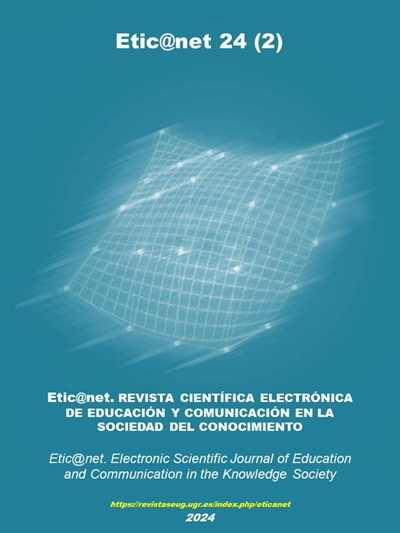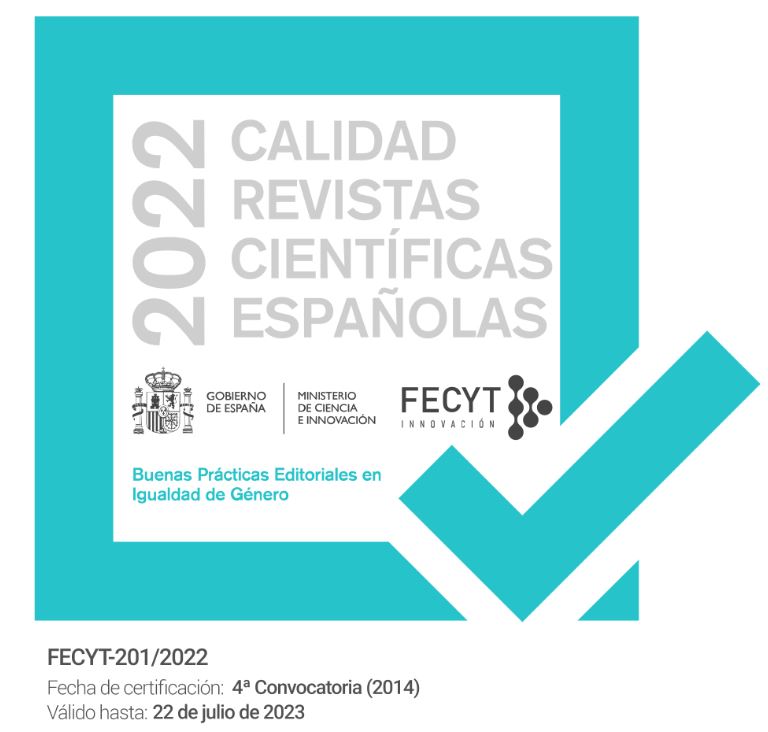Analysis of Interest, of Lifelong Learning, in Healthy Food and Nutrition at the University of Seniors of Extremadura
DOI:
https://doi.org/10.30827/eticanet.v24i2.31265Keywords:
Keyw Lifelong learning, seniors, food and nutrition.Abstract
In today's constantly evolving society, training and lifelong learning is one of the necessary strategies of learning opportunities for personal and social fulfillment and economic prosperity. This new educational paradigm, mainly promoted by UNESCO, is also a consequence of greater longevity, quality of life and well-being. Hence the need for continuous and lifelong training and updating of basic scientific, technological, financial and health knowledge. And thus achieve personal development and consequently the sustainable economic, social, cultural and environmental development of society. One of these learning that is demanded, of lifelong learning, given its constant scientific evolution is the knowledge in food and nutrition and health.
Objectives: To analyze in a sample of students in a Spanish University for Older Adults the level of interest for their scientific training of basic contents of: healthy eating habits and nutrition.
Methodology: The participants were 24 students belonging to the Universidad de Extremadura (Badajoz. Spain). Course 2023-24. And by means of a written questionnaire, individualized and anonymous. They were consulted in their classroom, about their characteristics: Basic (age: 69.7±4.9 years, sex: 62.5% female and 37.5% male), Anthropometric (100% with Normal Weight), and of Interest on Contents on Healthy Eating and Nutrition. The analysis of the data was analyzed in a mixed (Quan-qual) way by means of the following software: qualitative WEBqda© and quantitative statistics Jamovi©.
Results: As the most important results, it can be highlighted that this sample as a whole expressed high Levels of Interest in said training in Healthy Food and Nutrition. Mainly their interest lay in Content, for example in the qualitative Categories of: “Healthy Dietary Recommendations”, “Vegan Diet and Health? And “Interpret the nutritional characteristics on food labeling.”
Finally, it should be noted that the average value of the students' anthropometric condition was Normal Eeight =24.7±5.2 m2 of height /kg of weight, which can demonstrate their significant motivation to continue training in such scientific knowledge of: healthy eating habits and nutrition.
Conclusion: There is a high interest in lifelong learning, in knowledge of: healthy eating habits and nutrition, and where the anthropometric condition of Normal Weight or Healthy Weight can favor and boost, even more, the motivation on learning their scientific training.
Downloads
References
Albuquerque Araújo, L. D., Álvarez, A. J., Palomo, I., & Bustamante, M. A. (2019). Determinantes de la satisfacción con la alimentación en adultos mayores chilenos. Nutricion hospitalaria, 36(4), 805-812
Alimentación y nutrición saludable en los mayores Mitos y Realidades, publicado por la Sociedad Española de Geriatría y Gerontología. https://www.segg.es/media/descargas/GUÍA%20ALIMENTACIÓN%20Y%20NUTRICIÓN%20SALUDABLE.PDF
Arauco Lozada, T., Garrido Carrasco, P., & Farran Codina, A. (2021). Impacto sobre el riesgo de malnutrición y depresión en un ensayo clínico con intervención educativa nutricional en adultos mayores no institucionalizados, receptores de un servicio de teleasistencia en la ciudad de Tarrasa (España). Nutrición Hospitalaria, 38(2), 260-266.
Barboza, A. R., & Acosta, P. O. (2020). Conocimiento en nutrición, hábitos alimentarios y estado nutricional de adultos mayores en San Isidro del General, San José, Costa Rica 2019. Revista Hispanoamericana de Ciencias de la Salud (RHCS), 6(3), 134-142.
Cambrodón, G. (2015). Quality of the diet of the Spanish population over 80 years non-institutionalized. Nutricion Hospitalaria, 31(6), 2571-2577.
Camina-Martín, M. A., de Mateo-Silleras, B., Malafarina, V., Lopez-Mongil, R., Nino-Martín, V., López-Trigo, J. A., ... & de Geriatría, E. (2016). Valoración del estado nutricional en Geriatría: declaración de consenso del Grupo de Nutrición de la Sociedad Española de Geriatría y Gerontología. Revista Española de Geriatría y Gerontología, 51(1), 52-57.
Creswell, J. W. (2021). A concise introduction to mixed methods research. SAGE publications.
Cubas de Basterrechea, G., González Antón, C. T., Vega-Hazas Pérez, C. D. L., Elio Pascual, I., & Muñoz Cacho, P. (2020). Adherencia a la guía de alimentación saludable de la Sociedad Española de Nutrición Comunitaria (SENC) (2018) en personas mayores no institucionalizadas de Santander, España. Nutrición Hospitalaria, 37(5), 933-943.
Cubero, J., Carvalho, J. L., Luengo, L. M., Casas, L. M., Sánchez, S., & Luengo, R. (2021). Formación para el manejo de publicaciones científicas y páginas web en el ámbito sociosanitario. Educación Médica Superior, 35(3).
De la Hoz, A., Cubero, J., Melo, L., Durán-Vinagre, M. A., & Sánchez, S. (2021). Analysis of digital literacy in health through active university teaching. International Journal of Environmental Research and Public Health, 18(12), 6674.
Entonado, F. B. (2002). Los mayores, nuevos alumnos de la universidad. Revista Interuniversitaria de formación del profesorado, (45), 89-105.
Fichas Prácticas: Alimentación Saludable para Personas Mayores. https://www.segg.es/media/descargas/Fichas%20practicas%20alimentacion.pdf
Ganhão-Arranhado, S., Paúl, C., Ramalho, R., & Pereira, P. (2018). Food insecurity, weight and nutritional status among older adults attending senior centres in Lisbon. Archives of gerontology and geriatrics, 78, 81-88.
Gil-Gregorio, P., Ramos-Cordero, P., & Álvarez-Hernández, J. (2012). Alimentación y nutrición saludable en los mayores: mitos y realidades. Alimentación y nutrición saludable en los mayores: mitos y realidades.
González-Bermejo, D., Solano, M.D, Polache, J., Mulet, A., Barreda, D., Soler-Company, E. (2020). Los Comités de Ética Asistencial y los Comités de Ética de la Investigación en España: organización, regulación y funciones. Rev. OFIL·ILAPHAR. http://scielo.isciii.es/scielo.php?script=sci_arttext&pid=S1699714X2020000300206&lng=es
Guía Alimentaria saludable para personas mayores (2021), publicado por la Fundación Española de Nutrición y la Junta de Andalucía https://www.fen.org.es/storage/app/media/pdfPublicaciones/guia-alimentacion-mayores-pdf-1.pdf
Guía de Alimentación Saludable para Atención Primaria y Colectivos Ciudadanos publicado por la Sociedad Española de Nutrición Comunitaria (SENC) https://www.fesnad.org/resources/files/dipticoSENC.pdf
Guía de buena práctica clínica en Geriatría: Alimentación, nutrición e hidratación en adultos y mayores (2015). https://www.segg.es/media/descargas/Guia_ALIMENTACION_NUTRICION_E_HIDRATACION.pdf
Guía de orientación nutricional para personas mayores (2011), publicado por el Servicio Madrileño de Salud de la Comunidad de Madrid. https://www.madrid.org/bvirtual/BVCM009420.pdf
Instituto de Mayores y Servicios Sociales (INSERMO). (3 de junio de 2024). Los Mayores a un clic. https://imserso.es/espacio-mayores/estadisticas/mayores-un-clic
Jung, S. E., Bishop, A. J., Kim, M., Hermann, J., Kim, G., & Lawrence, J. (2017). Nutritional status of rural older adults is linked to physical and emotional health. Journal of the Academy of Nutrition and Dietetics, 117(6), 851-858.
Lucena, M. A. H., Montoro, M. Á., & García, A. M. R. (2017). Estudio sobre la formación en TICs en los centros de día de personas mayores de Andalucía: análisis desde la perspectiva de género. Etic@ net. Revista científica electrónica de Educación y Comunicación en la Sociedad del Conocimiento, 17(1), 76-90.
Luis-Pérez, C., Hernández-Ruiz, Á., Merino-López, C., & Niño-Martín, V. (2021). Factores de riesgo asociados a desnutrición en personas mayores que viven en la comunidad: Una revisión rápida. Revista Española de Geriatría y Gerontología, 56(3), 166-176.
Moreno-Crespo, P., & Cruz-Díaz, M. R. (2012). Promoción de la calidad de vida a través de los programas socioeducativos para mayores: Universidad y mayores. D. Cobos; A. Jaén, E. López, AH.
Recomendaciones Dietéticas Saludables y Sostenibles publicado por la Agencia Española de Seguridad Alimentaria y Nutrición, perteneciente al Ministerio de Consumo, Derechos Sociales y Agenda 2030 https://www.aesan.gob.es/AECOSAN/docs/documentos/nutricion/RECOMENDACIONES_DIETETICAS.pdf
Universidad de los Mayores en la Universidad de Extremadura. (5 de julio de 2024). Universidad de Mayores de Extremadura. https://www.unex.es/estudiar-en-la-uex/otras-propuestas-formativas/mayores
Van der Pols-Vijlbrief, R., Wijnhoven, H. A., Molenaar, H., & Visser, M. (2016). Factors associated with (risk of) undernutrition in community-dwelling older adults receiving home care: a cross-sectional study in the Netherlands. Public health nutrition, 19(12), 2278-2289.
Vásquez, J. X. T., Manchay, R. J. D., Montenegro, J. M. N., Risco-Vélez, D., & Vallejos, M. F. C. (2022). Adaptación a nuevos hábitos alimentarios en el adulto mayor diabético y participación familiar. Revista Científica de Psicología Eureka, 19(1), 156-170
Wanden-Berghe, C. (2022). Evaluación nutricional en mayores. Hospital a Domicilio, 6(3), 121-134.
World Medical Association. (2013). World Medical Association Declaration of Helsinki: Ethical Principles for Medical Research Involving Human Subjects. JAMA 310(20):2191–2194. https://jamanetwork.com/journals/jama/fullarticle/1760318
Downloads
Published
Issue
Section
License
The authors who publish in this journal agree to the following terms: The authors retain the copyright and grant the journal the right to be the first publication of the work as well as licensed under a Creative Commons Attribution License that allows others to share the work with an acknowledgment of the authorship of the work and the initial publication in this magazine. Authors are allowed and encouraged to disseminate their work electronically (for example, in institutional repositories or on their own website) before and during the submission process, as it may lead to productive exchanges as well as further citation. Earliest and greatest of published works (See The Effect of Open Access).













